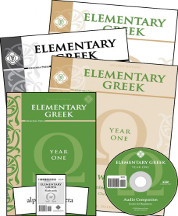Elementary Greek is a flexible program that might be used with students as young as fourth grade as well as by older students and even adults. With younger students, you will probably use it very interactively with much oral work. You might skip some written exercises. Older students can do more work independently. While high school students might be able to complete the course on their, own, they will still benefit from oral practice.
Elementary Greek teaches Koine Greek, the language of the New Testament. Biblical vocabulary is taught throughout the courses since the author assumes that students completing these courses are working toward being able to read the New Testament in Greek.
There are three year-long courses in the program: Year I, Year II, and Year III. Each course has 30 lessons, and each lesson should take about five days to complete. Older students might work through lessons more quickly, and younger students might need additional time. If students complete all of the steps of each lesson as instructed it should not take more than a half hour a day.
Year I begins with the Greek alphabet but it quickly moves into verb conjugation in the third lesson. First and second declension nouns are introduced this year. Third declension nouns are not taught until Year III. While students learn declensions with nominative, genitive, dative, and accusative cases, the first two cases are studied and applied in Year I while the dative and accusative are taught in Year II. Present tense verbs are taught in Year I, with other tenses added in Years II and III. Students will memorize the paradigms for these and other grammatical elements such as masculine, feminine, and neuter forms for adjectives and for the article the.
Lessons for each week begin with a Scripture memory verse in Greek. Generally, memory verses are presented in sections so that students are learning the verse in chunks over a few weeks. Five new Greek vocabulary words are presented at the beginning of each week’s lesson. After the seventh week, review takes place every day. Some lesson days are dedicated entirely to review.
The lessons in the text often provide explanatory information, even for vocabulary words. Author Christine Gatchell often presents tidbits of Greek grammar and usage along the way rather than in heavy doses.
Grammar paradigms are taught utilizing grammatical vocabulary students should have learned for English. Of course, there are additional grammatical points to learn for Greek that do not apply to English, but students need to be able to identify the syntax of words in English to be able to transfer that knowledge to their study of Greek. Students will be translating both Greek into English and English into Greek. For translating English into Greek, students learn to parse sentences by asking questions, but unless the teacher makes it so, this is not a chanted process as is used in Shurley Grammar.
Instruction is presented in each course textbook, but the companion workbooks are also essential. While students are directed to review and practice material taught in the text, all written assignments are to be completed in the workbook. Material in the workbook, such as sentences to be translated, is not duplicated in the text. Workbooks have blanks for students to write in words and sentences in both Greek and English. There are also paradigm charts to complete plus occasional crossword or word search puzzles.
Each level has a textbook, a workbook, an audio CD, and flashcards. The audio CD has pronunciations of letters, words, sentences, and grammar paradigms. The flashcard set for each level presents new vocabulary for practice.
Both Years I and II also have a set of tests plus a teacher key that has student workbook pages with overprinted answers. Tests keys are at the back of the teacher keys. Year III has an answer key for the student workbook at the back of the book, but there are no tests for Year III.
Summary
Elementary Greek seems very manageable because it presents lesson material in small pieces, with continual reinforcement and review. Daily lessons are laid out with clear instructions, so the courses are easy to use. Students who have already studied Latin will find it easier to tackle these courses since they will have already grasped the principles of inflected languages. Nevertheless, no prior study of either Latin or Greek is required for either the teacher or the student.









